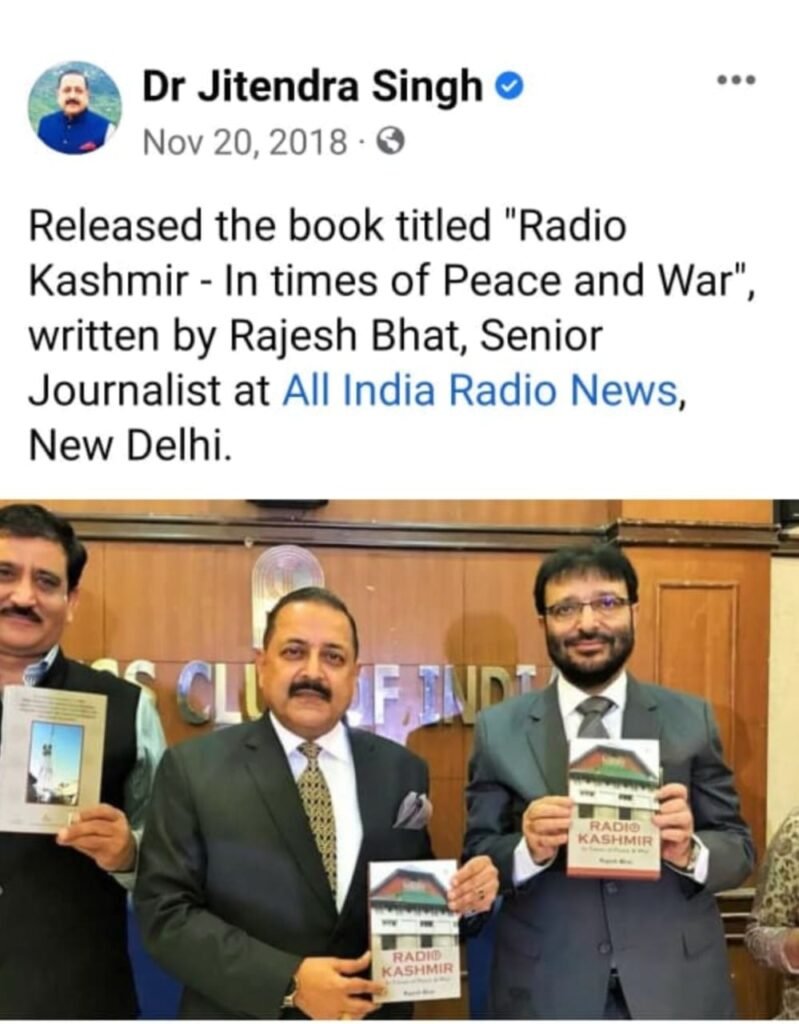(Kashmir Rechords Exclusive)
As tensions between India and Pakistan flare up once again—this time following the tragic killing of 26 innocent tourists in Pahalgam on April 22, and India’s subsequent launch of Operation Sindoor—a familiar battlefield has reopened, not on rugged frontiers or through skirmishes alone, but in the airwaves and digital shadows. The propaganda war has resurfaced, echoing the volatile chapters of 1947, 1965, 1971 and the Kargil conflict of 1999.
In this invisible war of words and perceptions, Pakistan has once again resorted to its time-tested tactic: disinformation. Weaponizing social media, mobilizing troll factories and resurrecting divisive narratives, the Pakistani deep state has shown how little it has evolved. The ghosts of Radio Jhootistan—a nickname earned during earlier wars for its habitual lying—are back. But so is the memory of how India countered that darkness with one of its most underappreciated strategic assets: Radio Kashmir, now rechristened as All India Radio, Srinagar/Jammu.
This media stronghold and its unsung role in defending India’s sovereignty through voice and truth, finds its finest documentation in “Radio Kashmir in Times of Peace and War”, a deeply researched and timely book by seasoned author, Dr. Rajesh Bhat. Released in November 2018 by Dr. Jitendra Singh, Minister in the PMO, the book reads not only as a chronicle of a radio station’s two wings—Srinagar and Jammu, but as a battlefield journal from the information frontlines.

How Propaganda Became Pakistan’s Old Weapon
The book lays bare Pakistan’s systematic use of underground radio stations—like the infamous Radio Trarkhal—to poison minds across the border and within Kashmir. These stations, funded and directed by Rawalpindi’s infamous propaganda cells, worked day and night to spread anti-India narratives, rouse communal passions and distort reality. They gained traction especially in border districts and conflict-hit zones, where trust in mainstream narratives was often fragile.
But for every lie that crossed the LoC, there stood Radio Kashmir, broadcasting calm amid chaos, facts against fiction. Whether during the tribal raids of 1947, the Indo-Pak wars, or even the holy relic crisis and the upheaval of 1990, Radio Kashmir was not just relaying news—it was building national morale.
The ‘Jawabi Hamla’: India’s Response Through Radio
Dr. Bhat’s book vividly recounts how India responded with what he terms the “Jawabi Hamla”—a strategic counter-narrative operation. Radio Kashmir didn’t mirror Pakistan’s venom but offered credible, timely and empathetic content. Anchored in Kashmiri, Urdu, Dogri, Gojri and other languages and dialects, culture, music and poetry, it became a voice the people trusted.
Even during curfews, shutdowns and insurgency, Radio Kashmir didn’t fall silent. It adapted. It resisted. At times, its reporters became frontline soldiers of truth, risking their lives to report stories that needed telling.
The station’s evolution—documented thoroughly in the book—mirrors Kashmir’s political journey. Beginning as a humble transmitter and a makeshift studio in 1947, it transformed into a guardian of the erstwhile State’s identity, dignity and national integration. The Book has rare anecdotes, archival interviews and photographs that bring to life not only the station’s political importance but also its emotional and cultural connect with region’s people.

The chapters on psychological operations (PsyOps), the cultural broadcasts that reached every home and the moral dilemmas of information handling during crises offer invaluable lessons for today’s media strategists.
Why This Book Matters Today
In an age where hybrid warfare and deepfake propaganda have replaced bullets in many battlespaces, the legacy of Radio Kashmir is more relevant than ever. The book offers insights into:
- Building credible counter-propaganda without resorting to hate.
- Creating culturally grounded narratives that resonate with local populations.
- Balancing military messaging with civilian empathy.
With India facing yet another surge of hostility from across the border and social media platforms flooded with misleading content, Radio Kashmir in Times of Peace and War is a timely reminder that truth, when delivered with clarity and conviction, is the most powerful weapon of all.
As New Delhi rethinks its communication doctrine in Kashmir and beyond, perhaps it’s time to revisit the voices that once defended India—not with guns, but with microphones.
To read more about this deeply researched account—with documentary evidence, rare photographs and stories from the heart of Kashmir’s most turbulent decades—get your copy by contacting:
📧 support@kashmir-rechords.com
📧 kashmirrechords@gmail.com